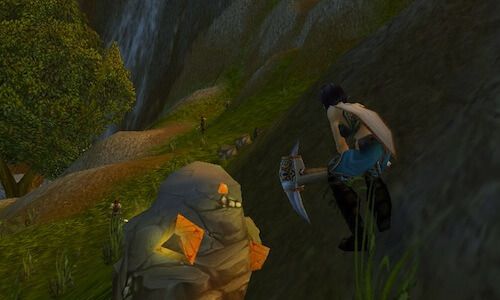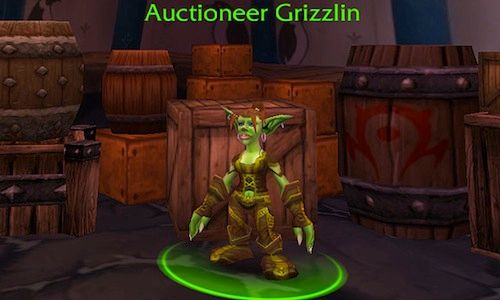In this edition of World of Warcraft Wisdom, I explore the foundation of the economics in Azeroth and their relation to being a perfect example of a free enterprise system of capitalism.
If you live and play in the United States or any other western country based on a capitalist economic model, then you live and have an idea of a free enterprise model of economics. The basic principles of a capitalist system are simple: the means of production are privately owned and operated for profit - moreover, we compete at an equal level for resources to keep the market moving smoothly. According to Adam Smith, whose treatise, The Wealth of Nations laid down the principles of a free market, an "invisible hand" would guide the markets and keep them in check.
While the governments of many capitalist nations intervene and regulate the markets to a certain degree, the means of production often are in private hands. As well, the "invisible hand" is kept in check in many of these places through regulations and other modes to insure that the market does remain stable.
One place, however, has no mechanism, no intervention from government, nor any means of production owned by a government — and that place is World of Warcraft. According to Eli Kosminsky, Blizzard has created a perfect "competitive market" in line with Adam Smith's idea of free enterprise. Of course, there is the exception of Blizzard setting and changing prices for "in-game" items such as training for mounts, flying, food, dual specialization (whose price was drastically reduced with Cataclysm), and the like - which has devalued gold quite a bit. Otherwise, there is a hands-off approach to the economics within the system.
I have noted before that I don't make too much gold. I make sure that I have enough to get what I need and a bit of what I want. For example, one needs to be able to fly, but one does not need the "Artisan" skill, which enables the rider to fly at 280% faster than walking. The "Expert" skill is quite fast at 150%, but compared to the "Artisan," it feels like a turtle's pace. So yes, when they can, my characters all have "Artisan" riding. Fortunately, Azeroth, like any good free market society, provides various manners to make gold so that those who want it all can, while those who who don't want much more than their needs can easily live. In addition, all of my characters are dual-specialized, which I purchased pre-Cataclysm when it cost 1,000 gold.
For the most part, all of my characters are simple gatherers. I have tried doing the full blown profession thing with tailoring (fully leveled through Wrath of the Lich King) and alchemy (also fully leveled through Wrath of the Lich King); as well, I have tried enchanting, jewel crafting, and blacksmithing, but to little success. I have never tried engineering, it just seems too "out there" for me, nor really anything my character could use, except, of course, for some really cool mounts. In balance with reality, I treat my mounts like my car — simple and easily paid for. In the end, though, I simply sell the materials (that is resources) I gather in the auction house (AH) - and in doing so, I make a pretty good living.
Here is how this works: all professions, both inside and outside of Azeroth, need raw materials (resources) to make goods for consumption. In both, there are people who sustain themselves simply on gathering these resources, be it mining, farming, ranching, and the like. In both, these people can live comfortable lives; however, both are subject to the fickle market forces of supply and demand. Notice that when either a new patch or expansion drops, the prices for raw materials go up, as many players want to craft the latest recipes - which they can sell in the AH for huge amounts. After a bit of time, the price of the materials begins to drop, as the demand for them drops. There is nothing aside from Smith's "invisible hand" guiding this.
I have my characters divided over two realms and have noticed that each realm acts as its own market. For example, my Horde characters are on Y'sondre, a low population realm, while my Alliance hide on Dragonmaw, a high population realm. The prices for goods in the AH on the high population server are often more than two or three times that of the low population server. While in reality the level of resources diminish and are finite, the resources in Azeroth do not and are infinite. Once you gather some herbs in a particular area, wait ten minutes, and you can gather them again. Reality does not work this way: pull the oil out of the ground and it is gone — forever.
But, with the high population comes a high demand for goods. To meet this demand, crafters need material, more than they can gather on their own, so they go to the AH and buy them. My priest on Dragonmaw was able to make a lot of gold (by my standard) simply selling herbs and skins. She has almost more than all of my Horde characters combined - doing nothing more than they have. At the same time, the price for goods reflects what the market can give. When an item on the low population server will sell for say 100g, the same item can go for 1,000g on the high population server.
There is, however, one real difference in the economics in Azeroth and that of the real world: class identity. If the real world could learn anything from Azeroth it is this: While the free market does provide anyone an opportunity to "level up" their profession to whatever level they like; the difference in the two is that in Azeroth I am not forced to live in some shanty simply because I choose not to go after the shiny objects or the cache of gold.
There is no difference in how the classes are treated in Azeroth, I get to use the same facilities as the guy with hordes of gold, I get to rest in the same inn, use the same flight paths, buy from the same vendors, use the same trainers, and so on. In reality, the separate classes remain divided, almost pitted against one another. We do not value those who provide us with our resources, we do not value those who craft our goods, in fact, we make them all second class citizens. A second class citizen in reality is not able to use the same facilities, go to the same schools, drink the same water, fly or drive the same vehicles, and so on. Moreover, there is the judgement factor between the classes. The only way in Azeroth you know I am not of the upper class is by looking at my mount, or inspect one's armor for heirlooms and other items that require purchasing. We so easily can tell one's economic class and judge that person for it.
Regardless, World of Warcraft can provide anyone a lesson in economics and the free market. So now it is your turn: what kind of money maker are you: Bill Gates or the barista at your local coffee shop?
For more World of Warcraft Wisdom, click — HERE.
SOURCES: Kosminsky, Eli. "Finding Adam Smith in Azeroth."World of Warcraft and Philosophy: Wrath of the Philosopher King. (2009): 17-26



